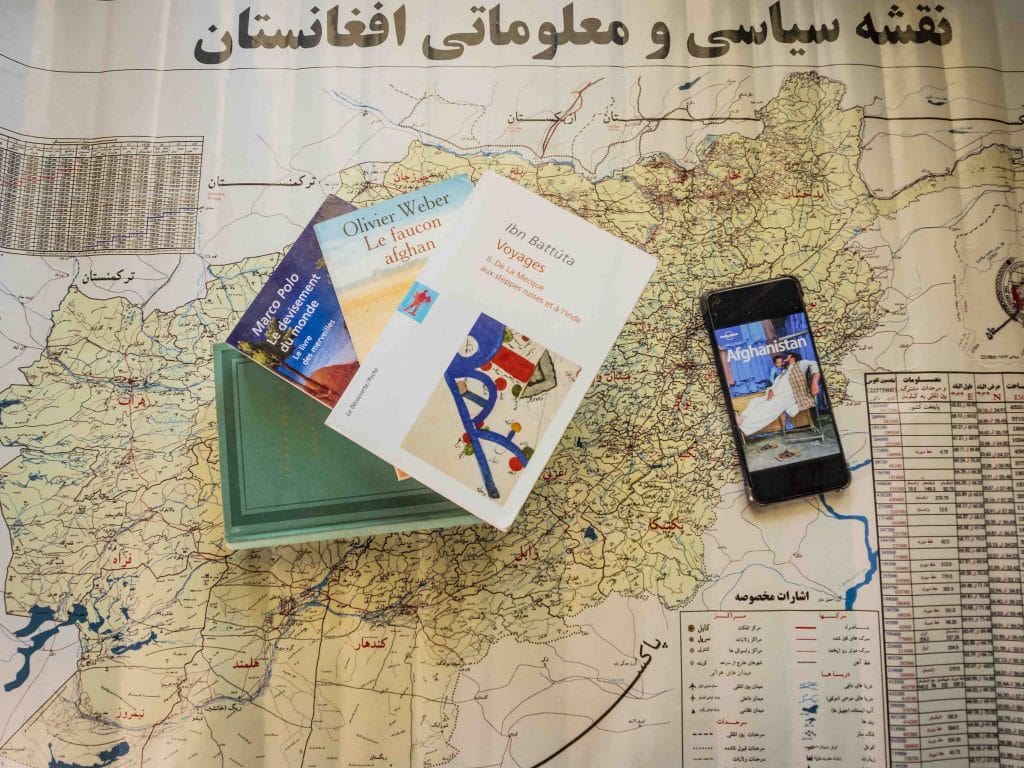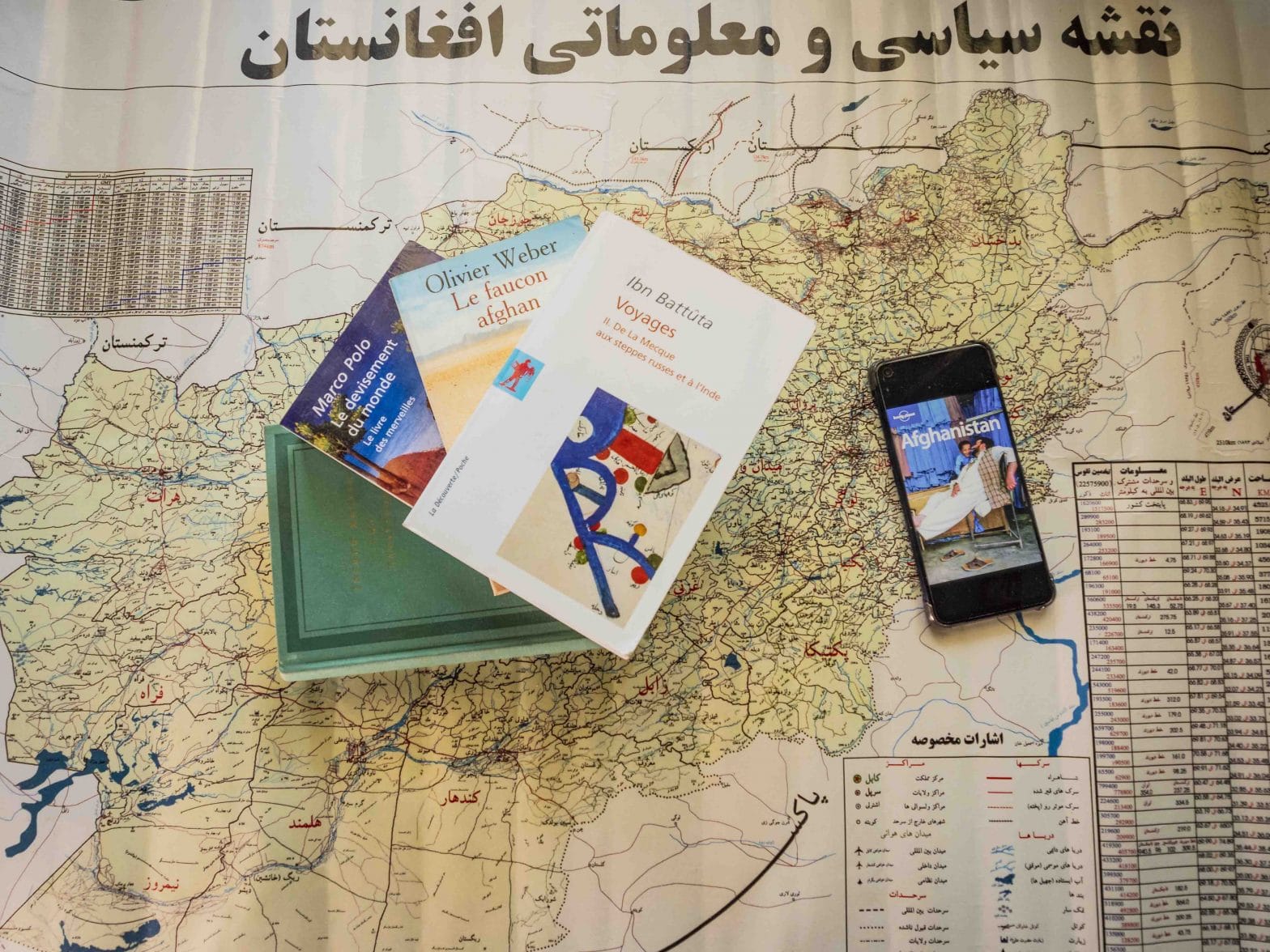How do you plan a trip to Afghanistan ?
It is probably even more complicated now, but here is how I did it back in 2018.

Where to find information ?
I am not the kind of traveller who likes to plan every detail before packing, but for these kinds of trips, there is a minimum of work to be do before-hand. Afghanistan is obviously not a place where you can show up with your backpack and hope that everything will be smooth.
Having travelled to India, Iran and Pakistan before, and having met with many Afghans there, probably helped to get a sense of what it would be like. I imagined the whole country a bit like Peshawar, and I really enjoyed that city in Pakistan, at the border with Afghanistan. Here is a video I took in 2011 riding my bicycle through the Storytellers’ market in Peshawar:
The main “tourist destinations” in Afghanistan that you have probably heard of are Kabul, the Wakhan Corridor, or Bamyan. Most foreigners visiting Afghanistan are or were journalists, officials, and NGO workers. There are few “real tourists” and I could find some pictures on Instagram, blogs, and forums. For most, it was a short trip or an organised tour, often to add another country to their travel trophies or to be able to say “I’ve been there”. There was also the overlander, the wanderers, those with a purpose and a genuine interest, but these accounts were really rare after 2007.
2007 was also the year Lonely Planet published its first and last travel guide for Afghanistan. After that year, everything went down in the country, and it really became more difficult to travel there. The book was really useful, as were most Lonely Planet books at that time, covering the whole country with good tips and cheap recommendations. In the section about Balkh, they even mention the story of Baba Ku, but without giving the location of the shrine. In “Afghanistan, Fortress of Cannabis” you will be able to read and listen to an interview of the malang tending the shrine. But, you can’t really rely on a Lonely Planet from 2007 to travel in 2018, (nor on Ibn Battuta and even less on Marco Polo) especially with the changes Afghanistan went through.

So I scanned the internet for information about Mazar-i Sharif: where to stay, where to go, etc. I found some forums with useful tips that were not so old, and there was a lot of information on wikitravel as well. My main worry was being refused in hotels. This happened to me several times in Pakistan, where hotel managers were sometimes not allowed to offer accommodation to foreigners due to security risks. Foreigners were forced to go to more expensive hotels with more protection. In Mazar, I understood most foreigners were going to the expensive Barat Hotel, but I was hoping that the much cheaper Aamo Hotel would accept me.
Then I tried to find some websites in English that would give daily news about what’s happening in the country. I usually follow Al Jazeera, but I wanted to find more information about daily life in English. I started to follow a few people on social networks, and I also found good information on Tolo News. It is a news website in English that gives various information about politics, economics, sports, local news, etc. I read here and there about dozens of newspapers and magazines being published in Afghanistan, so I was also hoping to maybe find an English publication when I get there.
What information did I find ?
Accommodation seemed possible in Mazar-i Sharif, and getting there too. But nothing about the possibility of moving around…
From what I could read, there were no major security issues in Mazar-i Sharif or Balkh. Kabul was much more tense with frequent bombings, at least once a week. Then there was obviously Kunduz, which seemed very dangerous. Many Afghans I met in Pakistan were from Kunduz, displaced by the war and insecurity.
Going back in time, the bombing of the German consulate in 2016 was the major event that shook Mazar-i Sharif, indicating that the Taliban were growing stronger in the North. That’s probably what pushed the Afghan embassy staff in Paris to tell me that “Afghanistan is not like France and Mazar-i Sharif is now more dangerous than Kandahar” before adding, “If you get the visa, you stay in your hotel, don’t go out.” I got the visa anyway, for one month, and I could not extend it, they said.
Reading ToloNews would not reassure me either. One story in particular made me think “but where am I going ?”. It was the story of a grandfather whose son and daughter-in-law died. They were the bread-winners of the family, and the grandparents were left alone with their three grand-daughters to take care of. After a few months, they decided to sell one of their granddaughters to be able to care for the other ones. As if the story was not tragic enough, he went to the market, sold the granddaughter, and got robbed of the money on his way back home. Remember that this was in 2018. Children (girls) being sold for marriage is probably increasing now, at least you hear more about it, but it was happening before the Taliban take-over.
I also found out that there were some parliamentary elections going on the same week I had planned to arrive in Mazar-i Sharif, so I made sure to arrive the week after.
What was the mood ?
It was really a step into the unknown, but I knew I wasn’t the first one to do it. If I was quite sure I could find hash easily, I was much less sure about other basic necessities, such as finding a place to sleep, maybe a sim card, and the most important of all, changing or withdrawing money.
Once all that is taken care of, I would need to get an idea of the security. All the questions racing through my mind were whether there would be too many guns and security issues, whether I would feel safe, and how people would react to me. I was also wondering what I would be able to do, would I be able to travel around the city, the province, the country; and if not, would I be able to stay in Mazar ?
Realizing that very few westerners had been there recently and that the trip was full of uncertainty also made it very interesting to me. If I remember well, in my most hopeful dreams, I was thinking that maybe I could travel around, try to find some hash makers, or a family, and spend the harvest season with them. I knew that the chance of this to happen was close to zero, but I wanted to see as much as I could of the Afghan traditional cannabis culture.
I also had the feeling that “if I don’t do it now, I’ll never do it”, that the conditions for a safe visit would probably not be met during my life-time, or that the situation could get even worse. The latter proved to be sadly true. There was also lines from a Lou Reed song resonating in my ears for some time. “Maybe I should go and live in Amsterdam” – “Maybe it’s time to see tangiers” – “A different life-style, some different fears” – “Or maybe I should get a farm in southern France” – “Shit, maybe I could go to Yucatan” – “So maybe I should go to Tanganyika” – “Or go to India to study chants and lose romance to a mantra’s dance” – “Maybe I should move to Rotterdam maybe move to Amsterdam I should move to Ireland, Italy, Spain Afghanistan where there is no rain…“
I really wish I could print this last line in the introduction of my book. Unfortunately, Lou Reed’s agents never replied to my request!
UP NEXT: The first day in Mazar.

